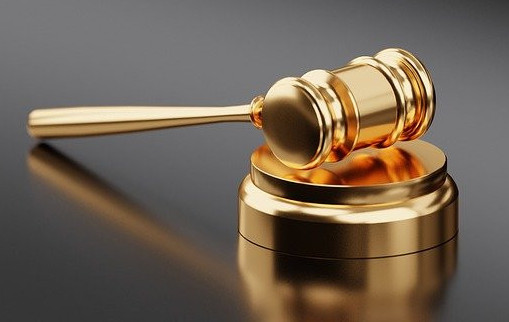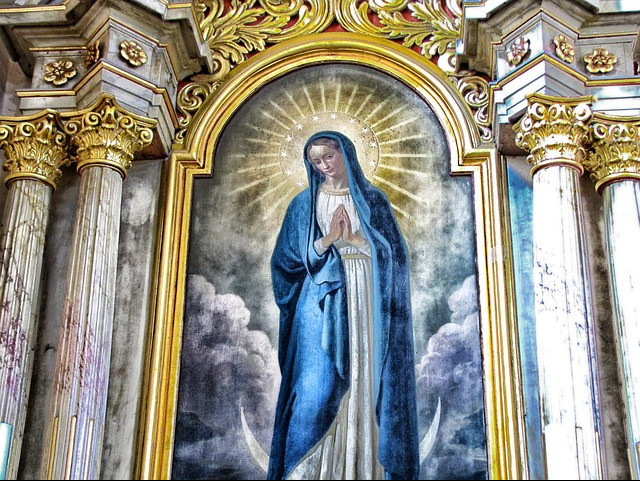Hello Rosary Lovers! In this post, we will ask: What is the Assumption of Mary?
The Dogma
The Assumption of Mary is the Catholic dogma that the Virgin Mary, at the end of her earthly life, was taken up body and soul into heaven.
That’s it. That’s all it is. The Church says nothing more on this matter.
This teaching was formally defined by Pope Pius XII in 1950 in his Apostolic Constitution MUNIFICENTISSIMUS DEUS (Defining the Dogma of the Assumption). You can read this Constitution here.
The Feast of the Assumption
The Feast of the Assumption is celebrated all over the Catholic world every 15th August. It is a massive Feast Day and Holiday all over the world.
It is one of the Church’s most important Days in her yearly calendar, and is a Holy Day of Obligation.
This means that Catholics must treat this day as if it were a Sunday, no matter which day of the week it falls. They should try to get to Mass, if work permits, and request the day off, if possible.
Many Catholic Churches hold numerous Masses on this day, or during the evening of the 14th, so that as many Catholics as possible can make Assumption Mass.
Did Mary die?
Who knows. The Church doesn’t say.
What she does say, through the Pope, is that Mary was not just taken to heaven as a spirit, but her body was taken also, so that her body is no longer on earth.
You will never find the bones or bodily relics of Mary in this world.
Like her Son, Jesus Christ, Mary went to heaven BODILY, that is, IN THE FLESH.
As far as we know, only two individuals are in heaven in the flesh: Jesus and Mary.
(There is a possibility St Joseph is also there bodily, but this is an open question in the Church.)
How is the Assumption of Mary different to the Ascension of Jesus?
When Jesus ascended to heaven, he ascended himself. He took himself to heaven. This is because Christ is God.
When Mary was assumed into heaven, she was assumed. It was something done to her by God. She didn’t do it herself, because she is not God.
Do Catholics have to believe in the Assumption of Mary?
Yes they do. One cannot remain in full communion with the Holy Catholic Church if one rejects this teaching.
It is a belief of the very essence of Catholicism. It is part of divine revelation. To reject this teaching is to reject God. To question this teaching is to question God. Here’s what the Pope says:
“45. Hence if anyone, which God forbid, should dare willfully to deny or to call into doubt that which we have defined, let him know that he has fallen away completely from the divine and Catholic Faith.”
Notice that a Catholic need only willfully ‘call into doubt’ what the Church teaches here to ‘completely’ fall away from ‘the divine and Catholic Faith.’
So, no – a Catholic cannot remain Catholic and willfully doubt this doctrine, much less willfully deny or reject it.
It is a dogma set in stone and must be treated as such.
What about someone who doesn’t know that this is an infallible dogma?
As with every Catholic teaching, if someone genuinely doesn’t know that this teaching is so important, then they are less guilty if they either don’t believe it or question it.
However, it would take a pretty ignorant Catholic to not know that this is a very important belief in the Church, since we celebrate it every single year.
If a Catholic hasn’t bothered to ask or find out what the Assumption means, having gone to Church for years, then they are probably responsible for their own ignorance. Priests preach this dogma every year during Mass, sometimes more than once.
But it is understandable that a Catholic perhaps hasn’t gone to Mass in a long, long time, and therefore doesn’t know that this doctrine is so important. So they don’t know if they believe in it or not.
This is probably the least of their worries, frankly. Such Catholics need to get back to the Church as soon as possible and back to Confession, to restore their faith.
Having done this, they should be willing to believe all the Church teaches, even if it takes them time to learn what the Church teaches.
What is a dogma?
In the Catholic Church, we have different levels of teachings.
Some Catholic practices/beliefs are of a non-fundamental nature. One of these would be the teaching on clerical celibacy for the Latin Church. This is a teaching which, in theory at least, could alter in the future.
Many Eastern Catholic priests are in fact married and sexually active within the Catholic Church, and the Pope has no issue with this. This is part of the Eastern Christian traditions, and it has been maintained by many Eastern Catholic priests.
Some Catholic teachings are of an important nature, and an authoritative nature, but not strictly of an ‘infallible’ or ‘dogmatic’ nature.
One of these would be the Church’s teaching against artificial contraception. This is something the Church has always believed, that artificial birth control is inherently wrong.
And yet, this is not a dogma of the Church. This doesn’t mean that this teaching is wrong, or even potentially wrong. But it does mean that it is not on par with a doctrine like the Church’s belief in the Trinity.
A Catholic who uses artificial birth control is not necessarily cut off from the Church. They remain in communion with the Church, but they do need to realise they are dissenting from the Church, and committing sin, even a rather serious sin.
This is a dangerous position to be in as a Catholic, and one that in time could result in them leaving the Church or rejecting other Church teachings.
It is unwise to reject or go against even these teachings of the Church which are not of the highest kind of authority. We owe such teachings our respect and obedience.
And then there are the highest kinds of Church teaching. These are of the very essence of Catholicism, and cannot be questioned or rejected at all if one wishes to remain in communion with the Catholic Church.

We call these DOGMAS. Here are some examples:
- The Church’s belief in the Trinity
- The Church’s belief in Mary’s immaculate conception
- The Church’s belief in icons/images
- The Church’s belief in the real presence of Jesus in the Eucharist
- The Church’s belief that abortion is absolutely unacceptable in all circumstances and very sinful
- The Church’s belief that Mary is the Mother of God
- The Church’s belief that the Holy Spirit eternally proceeds from the Father and (or through) the Son
- The Church’s belief that the Pope is the visible earthly Head of the Catholic Church
- And so on.
Many teachings are of this nature. They are infallible, cannot ever be reversed or questioned, and must always be held forever. They are the product of divine revelation within the Church.
One of these dogmas is the Assumption of Mary.
If you want to read more about tiers of teaching in the Church, click here.
So does this mean we can, to some degree, pick and choose what to believe in as Catholics?
No, it doesn’t. It is never wise to question or reject anything the Church teaches, even if some of her teachings are of a lesser authority than dogma.
If you question ANYTHING the Church teaches at all, you will end up training yourself to trust yourself instead of the Church. This is deadly for the soul, and can result in eventually questioning even Catholic dogmas.
It is far better for us to accept, by faith, and in submission, everything the Church teaches on any matter, so long as she has in fact spoken on a matter.
What if the Church hasn’t spoken with authority on a matter?
If the Church has not spoken with any authority on a matter, it is best to remain skeptical, because the Church is skeptical and hasn’t come down one way or the other.
One particular issue here would be: will every human who has ever lived go to heaven, or will most go to heaven, or will most go to hell? Will anyone be in hell forever?
These issues the Church has not settled, and they remain open. Catholics are entirely free to believe any of these options, but they should know that the Church doesn’t yet know the answer to these questions.
It would therefore be imprudent to force one’s own beliefs about these things onto other Catholics.
The best approach
What the Church believes firmly, we should also believe firmly.
What the Church teaches, we should accept, and not question.
What the Church is skeptical about, we should also be skeptical about.
The Church walks a straight line to heaven. Let us not turn to the right or to the left.
Obey what the Church teaches, and don’t be dogmatic on anything the Church is open-minded about.
If we do this, we shall be saved. This is the way to sainthood, and it’s the safest and surest way to become a saint.
One of the best ways to help us in this is to pray the Rosary daily. If you want help with this, please see many of the posts on this site.
If you want help with buying a Rosary, check out this useful post.
I trust you have found this post useful and if you would like to add anything, or have any questions, please leave them below in the comments.
God bless, through immaculate Mary, assumed into heaven for us!

